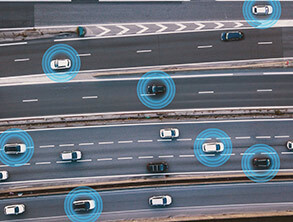On this page...
In Iowa, we view automated transportation as having four key components.
Back to topMulti-Modal Systems: Connected & Automated Vehicles

Today’s transportation system serves a wide variety of travel modes, users, and vehicle types. The transportation and automotive industry both recognize that achieving higher levels of safety and efficiency requires even more vehicles enabled with systems that correct and assist driver performance. These new capabilities are made possible through advanced on-board systems that are enabled by cameras, radars, and a range of other sensors that assist driver in real time through monitoring the roadway environment and driver tasks.
While there is some form of automation present or being pursued in all modes of travel, the focus in this context is automation on the surface (roadway) transportation system. Lastly, while technology continues to evolve, some key automation use cases have been identified to support freight (automated trucking – long haul/middle mile, small personal delivery devices), transit (fixed-route or on-demand), individual travel (commercial or privately owned passenger vehicles), and agency operations (roadway maintenance vehicles).
Back to topInfrastructure Systems: Digital and Physical
While roads, bridges, and other physical infrastructure are important to the transportation system, so too are other forms of infrastructure, those that are digital in nature – technology that supports communication, data, and the transmission of data to enable connectivity between a traffic management center, vehicles, or infrastructure.
Back to topInstitutional Systems: Enabling Policy and Supporting Services
Critical components not typically recognized are the institutional systems – such things as the enabling policy that allows for the operation of automated vehicles or devices on public roads and other support functions such as roadway maintenance and vehicle registration and titling.
Back to topCommunities, Businesses, & Travelers
The three system components above will need to be enabled or upgraded/retrofitted to support one another to integrate and allow the use of automated transportation modes on public roadway systems by communities, businesses, and travelers. These system interactions will be critical to ensure successful deployment and the safe integration of connected and automated vehicles and infrastructure.
Back to topAnticipated Benefits of Automated Transportation
Increased Safety
As an agency, one of our key priorities is safety – of both our staff and the traveling public. Transportation technology equipped with higher levels of automation, that assume the primary driving task, may one day help address key roadway safety challenges such as driver distraction, fatigue, impairment, and speeding. We have a long journey ahead of us to achieve the potential safety benefits of automation, but we’re not aware of any other technology or approaches that hold the promise to save lives and improve quality of life through transportation.
Accessibility & Mobility
Connected and automated vehicles can provide expanded accessibility and mobility options for those not able to drive or without a vehicle (e.g. aging populations, persons with disabilities, affordability challenges).
System Efficiency
Opportunities to improve supply chain efficiency while potentially reducing traffic congestion. While the business case for automated transportation continues to evolve, there is an opportunity to address workforce shortages for trucking or transit operations, potentially allowing for such vehicles to operate for extended hours and not sit idle.
Economic & Societal
Opportunity to reduce transportation barriers of where people live, work, and play. As high-speed internet and advanced communication technologies provide solutions for people to work remotely, automated transportation may provide expanded mobility options by allowing people to be productive and work while they travel.
Health & Environment
An opportunity to rethink how we plan our communities and where we live to maximize health and sustainable transportation. As automated transportation solutions come online and become more prevalent, it has already made us rethink how we manage the use of curb space in communities. It could also change how we plan and provide space for such things as public parking and other related uses (e.g., electric vehicle charging stations), potentially allowing for expanded open spaces for active transportation modes like cycling and walking.
Back to top